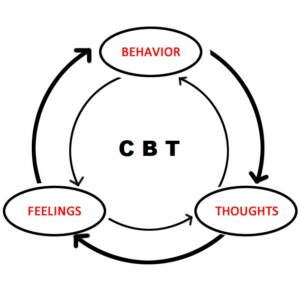Do you have intrusive thoughts that are causing you distress? If so, you may be suffering from OCD. This condition can be very frustrating and debilitating, but there is hope! In this blog post, we will discuss 13 different treatment methods for OCD thoughts. There is no “one size fits all” approach to treating this condition, so it is important to find the method that works best for you.
What Are OCD Thoughts?

OCD thoughts are recurrent and persistent thoughts, urges, or images that are experienced as intrusive and unwanted, causing distress and anxiety. They cause sufferers to worry excessively about their ability to control their thoughts or perform certain rituals or behaviors to reduce their discomfort.
The reoccurring thoughts can be time-consuming and interfere with daily activities. OCD thoughts are often accompanied by physical sensations like increased heart rate, sweating, or difficulty breathing. Some people may struggle with obsessive thoughts related to a specific topic such as contamination, health, or symmetry.
Negative impacts of OCD thoughts may include difficulty being productive at work or school, feeling disconnected from family and friends, and an inability to enjoy activities.
OCD Thoughts Treatment Methods
Treatments for obsessive-compulsive disorder (OCD) often involve a combination of psychotherapy, medication, and lifestyle changes. Here are 13 approaches that may help you manage your OCD thoughts and reduce their intensity:
Cognitive Behavioral Therapy (CBT)

CBT is a type of psychotherapy that helps individuals identify distorted thinking patterns related to obsessive thoughts and replace them with more positive coping strategies. Through this therapy, patients learn healthy ways of managing uncomfortable emotions and can address any underlying psychological issues that may be contributing to the OCD symptoms. This method has been proven to be effective in treating OCD and can yield long-term relief.
Exposure and Response Prevention (ERP)
ERP is a type of cognitive behavioral therapy specifically designed to help individuals confront their fears without reacting to them. This exposure helps patients build tolerance levels over time and eventually manage the obsessive thoughts with less fear and anxiety. The treatment involves gradually exposing the patient to their triggers and teaching them how to respond with more adaptive behaviors.
Medication
Antidepressants such as selective serotonin reuptake inhibitors (SSRIs) are commonly prescribed for the treatment of OCD. These medications work by blocking the reabsorption of serotonin, which is believed to play a role in causing obsessive thoughts. While medication can help manage the symptoms, it’s important to note that it does not address any underlying psychological issues and should be used in combination with other therapies. Some medications may produce side effects, so it’s important to discuss the potential risks with your doctor.
Relaxation Techniques
Stress-reduction techniques such as meditation, deep breathing, and progressive muscle relaxation can help individuals manage their anxiety related to OCD thoughts. As these techniques help lower cortisol levels, they can make it easier for patients to cope with intrusive thoughts without engaging in compulsive behaviors. Some of these relaxation methods can be practiced on your own, while others may require the guidance of a mental health professional.
Religious/Spiritual Practices
Many individuals find relief from their OCD thoughts through religious or spiritual practices. This could include praying, attending religious services, reading holy books and scriptures, or meditating in a peaceful setting. Some may also find comfort in rituals such as lighting candles and chanting mantras. These activities can help an individual gain a sense of peace and understanding, which may reduce the intensity of their obsessive thoughts.
Support Groups

Talking to other individuals who are also struggling with OCD can be immensely helpful in managing intrusive thoughts. Support groups provide a safe and non-judgmental space for members to discuss their experiences and share strategies for managing symptoms. This type of group therapy can also serve as a reminder that you are not alone in this battle. These groups can be found in various settings, including online forums and local community centers.
Journaling
Writing down your thoughts and feelings can help you make sense of them and gain a better understanding of yourself. Keeping a journal or diary is an effective way to identify triggers, recognize patterns in your behavior, and track your progress over time. This method allows individuals to express themselves without fear of judgment and provides relief from intrusive thoughts. Also, it serves as evidence of your progress, which can be a great source of encouragement.
Hypnosis
Hypnotherapy is another form of treatment that can help individuals manage OCD thoughts. This method works by inducing a trance-like state through relaxation techniques and guided imagery. During the session, the therapist will work with you to identify any underlying psychological issues and develop more adaptive ways of coping. Hypnotherapy is successful in alleviating symptoms associated with OCD, such as intrusive thoughts and compulsive behaviors.
Neurofeedback
Neurofeedback is an emerging technology that uses real-time EEG recordings to provide feedback about brain activity. The goal of this technique is to rewire the brain and alter its neurological pathways. This method is effective in managing OCD symptoms, such as intrusive thoughts and compulsive behaviors. Neurofeedback can also help patients gain greater control over their thoughts and emotions.
Physical Exercise
Regular physical activity helps to reduce anxiety levels and improve overall well-being. Exercise releases endorphins that boost mood and increase self-confidence. It also serves as a healthy distraction from obsessive thoughts and compulsive behaviors. Regular exercise may not only improve mental health, but it can also help individuals better manage their physical symptoms, such as fatigue and insomnia.
Nutrition

Certain nutritional changes may improve overall mental well-being, which could lead to fewer OCD symptoms. Eating foods high in essential nutrients such as omega-3 fatty acids, B vitamins, Vitamin D, and probiotics can help promote healthy brain functions and alleviate some of the anxiety related to obsessive thoughts. Also, cutting back on processed foods and sugar can help reduce stress levels and improve overall health.
Complementary Therapies
Many alternative therapies can help to treat OCD symptoms. These include mindfulness-based approaches such as yoga, acupuncture, massage therapy, aromatherapy, and Reiki. These treatments focus on creating a sense of relaxation and providing an alternate outlet for dealing with intrusive thoughts. They can also act as a form of self-care that enhances overall well-being. Also, engaging in creative activities such as art, music, or writing can help to provide relief from obsessive thoughts.
Visualization
An effective technique for managing intrusive thoughts is visualization. This involves picturing a safe and calming place, such as the beach or a forest. Then, visualize yourself in that space and take deep breaths to relax your body and mind. You can also use positive affirmations to replace negative automatic thoughts with more optimistic ones. Visualization can help individuals gain greater control over their emotions and reduce stress levels related to OCD symptoms.
Conclusion
OCD thought treatment is a complex and often difficult process that may take months or even years to find relief from obsessive thoughts. However, there are a variety of treatments available, such as medication, Cognitive Behavioral Therapy (CBT), Exposure Response Prevention (ERP), and self-help strategies. It’s important to work with a certified mental health professional who has experience treating OCD to develop an individualized recovery plan. With patience and dedication to treatment, it’s possible to reduce the intensity and frequency of intrusive thoughts.
It’s also vital to prioritize self-care by engaging in activities that can help reduce stress, build self-confidence, and provide a sense of control.
For more information and guidance, please contact OCDMantra. OCD is a mental health disorder characterized by obsessions and compulsions. If you have any queries regarding OCD treatment, ERP therapy experienced therapists at OCDMantra can help: Book a trial OD therapy session.


